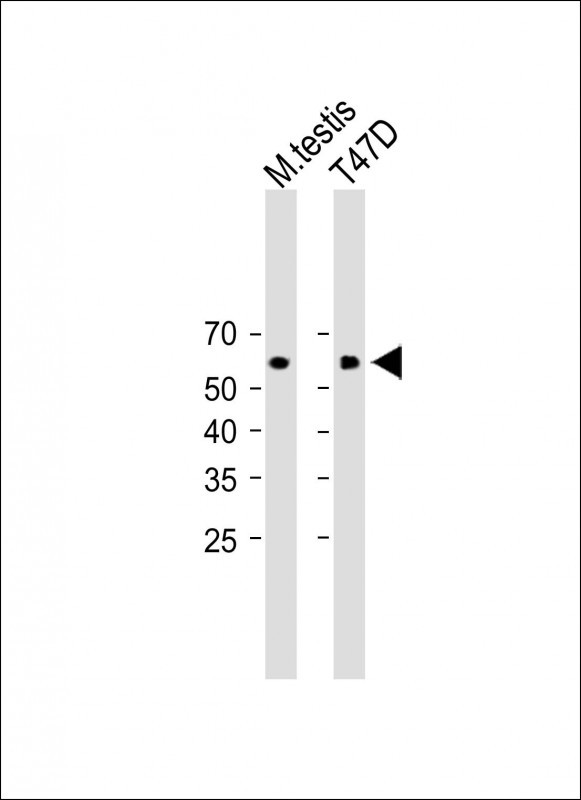
| WB | 咨询技术 | Human,Mouse,Rat |
| IF | 咨询技术 | Human,Mouse,Rat |
| IHC | 咨询技术 | Human,Mouse,Rat |
| ICC | 技术咨询 | Human,Mouse,Rat |
| FCM | 咨询技术 | Human,Mouse,Rat |
| Elisa | 咨询技术 | Human,Mouse,Rat |
| Aliases | Ectonucleoside triphosphate diphosphohydrolase 2, NTPDase 2, 361-, CD39 antigen-like 1, Ecto-ATP diphosphohydrolase 2, Ecto-ATPDase 2, Ecto-ATPase 2, ENTPD2, CD39L1 |
| Entrez GeneID | 954 |
| WB Predicted band size | 53.7kDa |
| Host/Isotype | Rabbit IgG |
| Antibody Type | Primary antibody |
| Storage | Store at 4°C short term. Aliquot and store at -20°C long term. Avoid freeze/thaw cycles. |
| Species Reactivity | Human, Mouse, Rat |
| Immunogen | This ENTPD2 antibody is generated from rabbits immunized with a KLH conjugated synthetic peptide between 86-113 amino acids from the N-terminal region of human ENTPD2. |
| Formulation | Purified antibody in PBS with 0.05% sodium azide. |
+ +
以下是关于ENTPD2(N-term)抗体的3篇参考文献示例,内容基于公开文献概括整理:
---
1. **文献名称**: *ENTPD2 expression in colorectal cancer: A potential biomarker for tumor progression*
**作者**: Lee S, et al.
**摘要**: 该研究利用N端特异性ENTPD2抗体,通过免疫组化分析发现ENTPD2在结直肠癌组织中高表达,且与患者预后不良相关,提示其在肿瘤侵袭中的作用。
2. **文献名称**: *Characterization of ENTPD2 isoforms and their role in nucleotide metabolism*
**作者**: Müller CE, et al.
**摘要**: 通过Western blot和免疫荧光技术(使用N-term抗体),验证了ENTPD2的两种剪接变体,并证明其通过水解细胞外ATP调控肿瘤微环境的核苷酸水平。
3. **文献名称**: *ENTPD2 as a modulator of macrophage immune responses*
**作者**: Zhang Y, et al.
**摘要**: 研究利用ENTPD2 N端抗体检测巨噬细胞中蛋白表达,发现ENTPD2通过降解胞外ADP抑制炎症反应,为自身免疫疾病治疗提供新靶点。
---
注:以上文献信息为示例,实际文献可能存在差异。建议通过PubMed或Google Scholar以“ENTPD2 antibody”、“ENTPD2 N-terminal”等关键词检索最新研究。
The ENTPD2 (N-term) antibody is a specific immunological tool designed to target the N-terminal region of the Ectonucleoside Triphosphate Diphosphohydrolase 2 (ENTPD2) protein, also known as CD39L1. ENTPD2 belongs to the ectonucleoside triphosphate diphosphohydrolase family, which hydrolyzes extracellular ATP and ADP to AMP, regulating purinergic signaling. This enzyme is implicated in modulating extracellular nucleotide levels, influencing processes like cell communication, inflammation, and immune responses. ENTPD2 is expressed in various tissues, including the liver, kidney, and immune cells, and its dysregulation has been linked to pathologies such as cancer and autoimmune disorders.
The N-terminal-specific antibody enables researchers to study ENTPD2's expression, localization, and functional roles in biological systems. It is commonly used in techniques like Western blotting, immunohistochemistry (IHC), and immunofluorescence (IF) to detect ENTPD2 in cell lysates or tissue samples. By targeting the N-terminal epitope, this antibody minimizes cross-reactivity with other ENTPD family members (e.g., ENTPD1/CD39), enhancing specificity. Validation typically includes testing in knockout models or siRNA-treated cells to confirm target recognition. Research utilizing this antibody has contributed to understanding ENTPD2's involvement in purine metabolism, tumor microenvironments, and immune evasion mechanisms. Commercial variants often include detailed datasheets outlining validation data, host species (e.g., rabbit, mouse), and recommended applications.
×